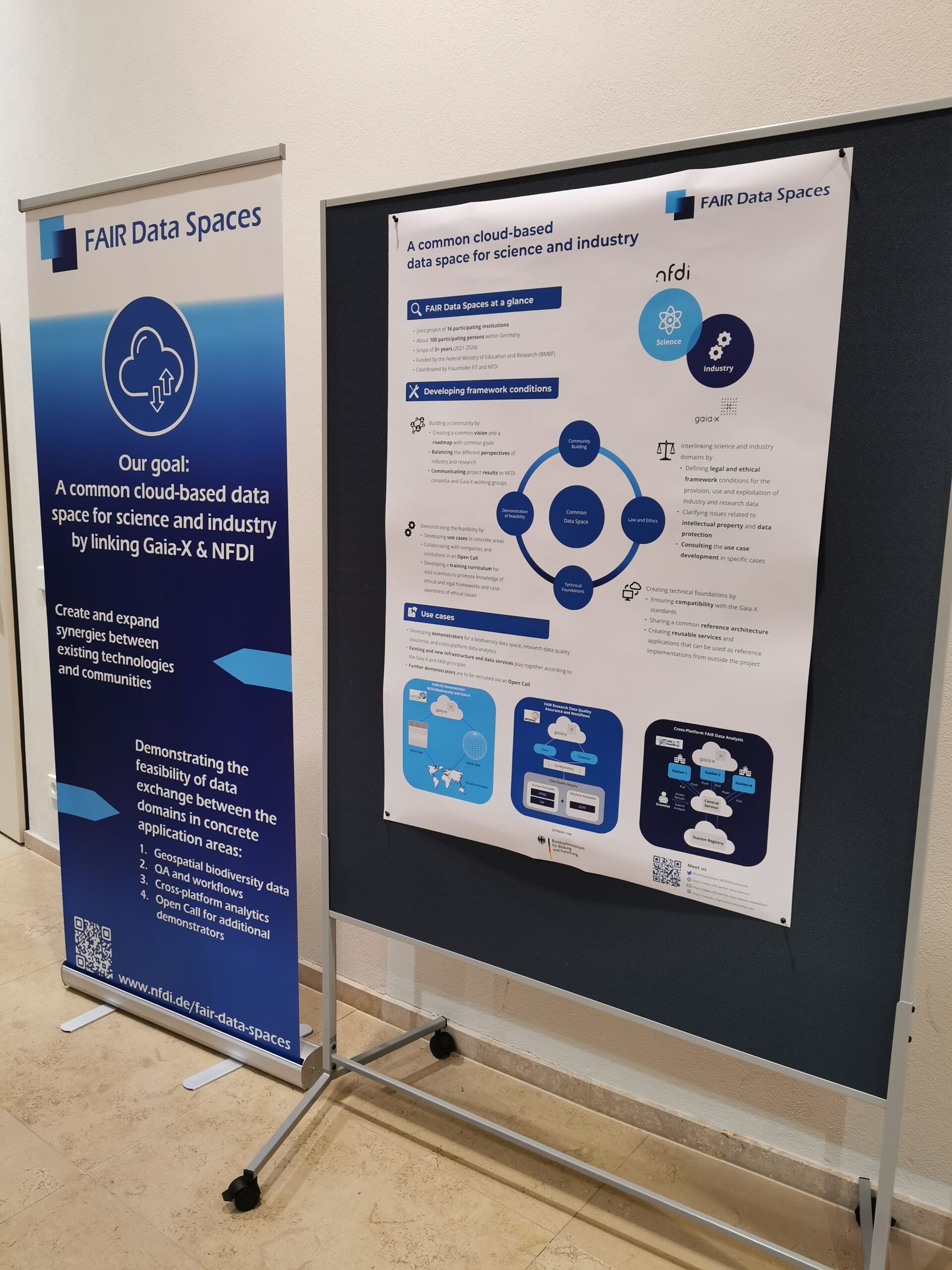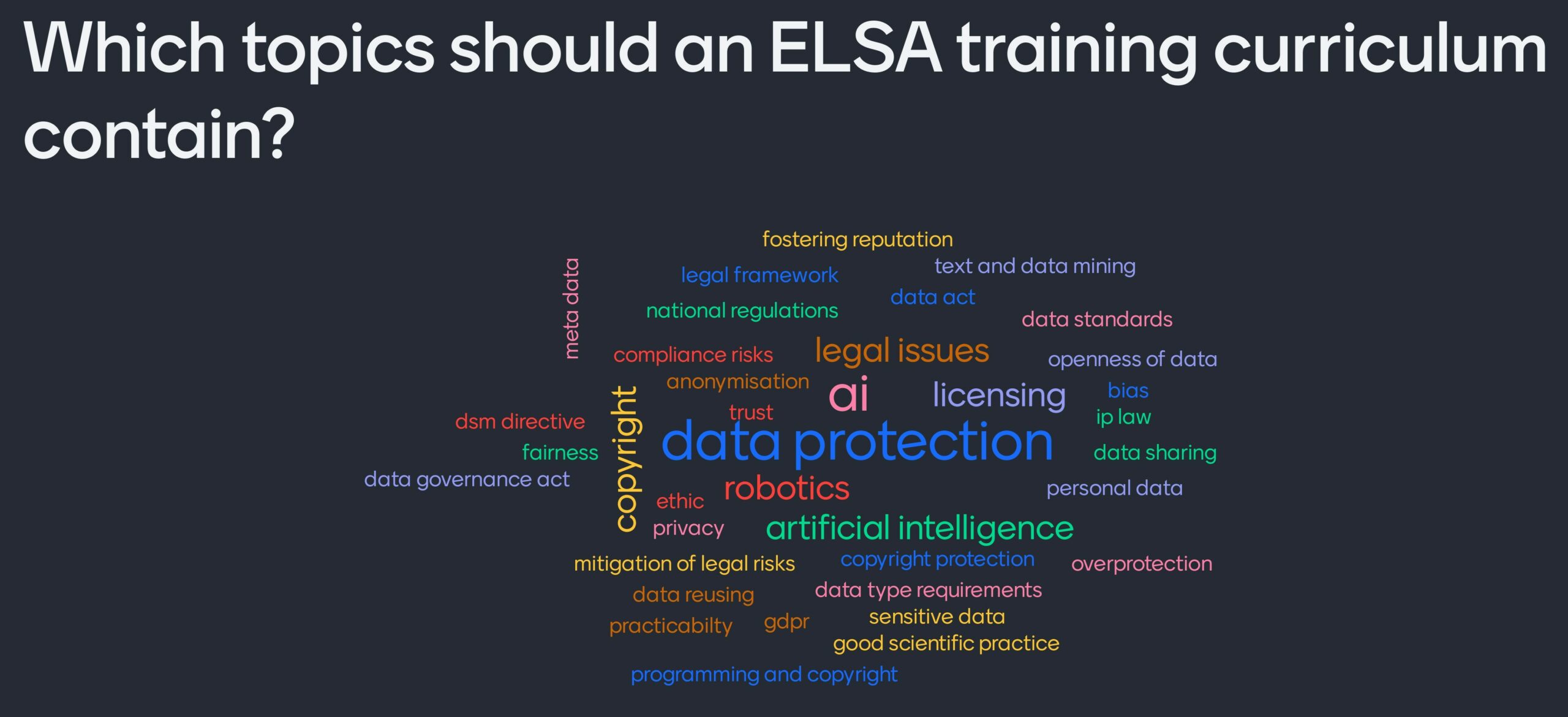FAIR Data Spaces News
FAIR DS @ RfII Herrenhäuser Konferenz
Im April fand die Herrenhäuser Konferenz „Datenräume in Deutschland und Europa gestalten – Impulse der Wissenschaft“, veranstaltet vom Rat für Informationsinfrastrukturen (RfII) und der Volkswagenstiftung, statt. An den zwei Konferenztagen wurde ein Blick auf den aktuellen Infrastrukturausbau geworfen und diskutiert, wie Dateninfrastrukturen wie NFDI und EOSC nachhaltig und qualitätsgesichert aufgebaut werden können. Zudem spielte auch die Vernetzung der Infrastrukturen innerhalb der Wissenschaft sowie die Vernetzung mit außerwissenschaftlichen Infrastrukturen wie Gaia-X eine wichtige Diskussionsrolle. Das abwechslungsreiche Programm aus Vorträgen, Paneldiskussionen und Workshops wurde von einer durchgängigen Posterausstellung begleitet. FAIR Data Spaces war mit dabei und präsentierte den aktuellen Stand der Demonstratoren sowie einen Einblick über die Entwicklung der Rahmenbedingungen, die nötig sind, um einen souveränen und vertrauensvollen Datenaustausch zu ermöglichen.
FAIR DS @ RfII Herrenhäuser Conference
In April, the Herrenhäuser Conference „Datenräume in Deutschland und Europa gestalten – Impulse der Wissenschaft“, organized by the Council for Scientific Information Infrastructures (RfII) and the Volkswagen Foundation, took place. The two days of the conference took a look at the current infrastructure development and discussed how data infrastructures such as NFDI and EOSC can be established in a sustainable and quality-assured manner. In addition, the connection of infrastructures within science as well as the networking with non-scientific infrastructures such as Gaia-X also played an important role in the discussions. The varied program of talks, panel discussions and workshops was accompanied by a continuous poster exhibition. FAIR Data Spaces was there and presented the current status of the demonstrators as well as an insight into the development of the framework conditions that are necessary to enable sovereign and trustworthy data exchange.

+++
Projektinterner Architektur-Workshop
Ende Juni fand ein projektinterner Workshop zur Gaia-X Architektur statt. Gemeinsam mit dem technischen Arbeitspaket und den Demonstratoren diskutierte FAIR DS-Mitglied Klaus Ottradovetz (Atos & stellv. Leiter des Gaia-X Technical Committee) verschiedene Komponenten des Gaia-X Frameworks und nächste mögliche Schritte in der Anbindung von FAIR DS an Gaia-X. Auch ein Ausblick auf kommende Gaia-X Implementationen fehlte nicht.
Project internal architecture workshop
An internal project workshop on the Gaia-X architecture took place at the end of June. Together with the technical work package and the demonstrators, FAIR DS member Klaus Ottradovetz (Atos & Co-lead of the Gaia-X Technical Committee) discussed various components of the Gaia-X framework and next possible steps in connecting FAIR DS to Gaia-X. Also, an outlook on upcoming Gaia-X implementations was not missing.
+++
Zweiter ELSA Community-Workshop
Der zweite FAIR Data Spaces Community-Workshop der Reihe „Towards creating an ELSA Curriculum for Data Scientists“ fand am 14. Juni online statt und wurde von einer Vielzahl von Fachleuten besucht. Der Workshop war eine Fortsetzung des ersten ELSA-Workshops, der letztes Jahr stattfand. Zu den Beiträgen gehörten die Präsentation der ersten Version eines vorgeschlagenen ELSA-Lehrplans für Datenwissenschaftler/innen, die FAIR Data Spaces-Demonstratoren und die damit verbundenen rechtlichen Fragen als Anwendungsfälle für einen solchen Lehrplan. Den Abschluss bilde ein eingeladener Vortrag, in dem ein praktisches Rahmenwerk vorgestellt wurde, das Teams bei der Entwicklung vertrauenswürdiger KI-Systeme und Datenstrategien hilft, indem es Fachwissen und Ausbildung aus den Bereichen Philosophie, Recht, maschinelles Lernen und Design kombiniert. Die Folien der Präsentationen sind in der FAIR Data Spaces Zenodo-Community zu finden, wo auch die Videos der Präsentationen in Kürze hochgeladen werden.
Second ELSA community workshop
The second FAIR Data Spaces community workshop of the series “Towards creating an ELSA Curriculum for Data Scientists” took place online on June 14th with wide attendance by a great variety of domain experts. The Workshop was a follow-up of a first ELSA Workshop that took place last year. Contributions included the presentation the first version of a proposed ELSA Curriculum for Data Scientists, the FAIR Data Spaces demonstrators and their corresponding legal issues as Use Cases for such a Curriculum, and finished with an invited talk introducing a practical framework that helps teams build trustworthy AI systems and data strategies by combining expertise and training from philosophy, law, machine learning and design. The slides of the presentations can be found in the FAIR Data Spaces Zenodo community, where also the videos of the presentations will be uploaded soon.

+++
GXFS Tech Workshop mit FAIR DS-Beteiligung
Der Workshop brachte Forschungsinstitute und Fachleute aus der Industrie zusammen, die sich mit verschiedenen Aspekten des Gaia-X-Ökosystems befassen. Der Workshop bestand aus drei Arten von Veranstaltungen: Wissenstransfer-Sitzungen, Live-Demos von Produkten und ein Hackathon, bei dem die Teilnehmenden praktische Erfahrungen sammeln konnten.
Am ersten Tag gaben Christoph Lange-Bever (Leiter der Abteilung Data Science und Künstliche Intelligenz am Fraunhofer FIT, Leiter des GXFS-Arbeitspakets Selbstbeschreibung und Projektkoordinator von FAIR DS) und sein Team einen konzeptionellen Überblick über Verifiable Credentials, Verifiable Presentations und Decentralized Identifiers im Zusammenhang mit Gaia-X Self-Descriptors (SD). Sie demonstrierten auch ihren GXFS-Katalog, der zur Speicherung der SDs von Providern und Serviceangeboten verwendet wird. Die Sitzung behandelte die Verwendung verschiedener APIs während des Lebenszyklus von SDs, einschließlich Erstellung, Änderung und Löschung. Es wurde auch erklärt, wie man die SDs auf Gaia-X-Konformität validiert, neue Schemata zum Katalog hinzufügt und den Katalog mit der Graphenabfragesprache Cypher nach Services abfragt. Zum Schluss zeigten sie den Teilnehmenden, wie sie den föderierten Katalog lokal einsetzen können. FAIR-DS könnte seine eigene Instanz des GXFS-Katalogs erstellen, um die SDs der Demonstratoren zu speichern. Die Gespräche mit den Entwicklern darüber laufen derzeit.
GXFS workshop with FAIR DS participation
The workshop brought together research institutes and industrial professionals who are working on various facets of the Gaia-X ecosystem. The workshop consisted of three types of events: Knowledge Transfer sessions, Live demos of products, and a hackathon to provide participants with hands-on experience.
On the first day, Christoph Lange-Bever (Head of the Data Science and Artificial Intelligence Department at Fraunhofer FIT, head of the GXFS work package Self Description and project coordinator of FAIR DS) and his team provided a conceptual overview of Verifiable Credentials, Verifiable Presentations, and Decentralized Identifiers in relation to Gaia-X Self-Descriptors (SD). They also demonstrated their GXFS catalogue, which is used to store the SDs of Providers and Service Offerings. The session covered the usage of different APIs throughout the lifecycle of SDs, including creation, modification, and deletion. They also explained how to validate the SDs for Gaia-X compliance, add new schemas to the catalogue, and query the catalogue for services using the graph query language called Cypher. Towards the end, they showed the participants how to deploy the federated catalogue locally. FAIR-DS could create its own instance of the GXFS Catalogue to store the SDs of the demonstrators. Talks with the developers about this are currently ongoing.
+++
Andere Beiträge
FAIR Data Spaces Newsletter Dezember 2024 (Nr. 4)
FAIR Data Spaces-Newsletter December 2024 (Nr. 4)
FAIR Data Spaces Newsletter November 2024 (Nr. 3)
FAIR Data Spaces-Newsletter November 2024 (Nr. 3)
FAIR Data Spaces Ausschreibung „Round 2“: Demonstratoren gesucht!
Um nachzuweisen, dass unser FAIRer Datenraum auch in der Praxis funktioniert, setzen wir sogenannte Demonstratoren ein.
In der zweiten Ausschreibung (“Runde 2”), die bis zum 20.09. 2024 geöffnet ist, können sich Unternehmen mit ihrem spezifischen Anwendungsdomänenwissen bewerben und dabei helfen, FAIR Data Spaces bekannter zu machen.
Recent Comments